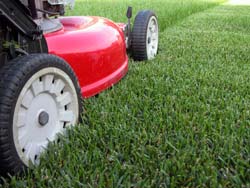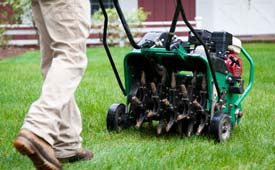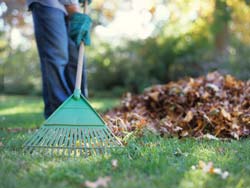Skip the fertilizer
Everyone wants a healthy looking lawn. That is why applying fertilizer in the spring is such a popular practice. Fertilizer may “green up” your lawn in the spring, but that does not mean it is healthy. Lawns need much less fertilizer than is advertised and applying too much fertilizer can actually weaken grass roots, alter soil pH, promote disease, and contribute to thatch build-up.
Avoid applying fertilizer during the spring and summer months. Fertilizer applied during this time only promotes excessive top growth, which means more watering and maintenance for you. This will save you time and money, and help prevent stormwater runoff from polluting our local waterways.
Maintain a higher mowing height
Mowing height is perhaps the most important aspect of lawn care. Mowing height is directly proportional to root depth, which means lawns maintained at higher mowing heights are healthier and more drought resistant. Higher mowing heights also provide more shade, reduce soil temperature, and increase weed resistance.
For a healthy lawn, maintain a mowing height of 3 inches or more. Never remove more than 1/3 of the total leaf surface at a time. This means more frequent mowing may be required during periods of rapid growth. One more reason to avoid applying fertilizer in the spring!
Use a mulching mower
Bagging your grass clippings robs your lawn of nutrients. Grasscycling, or leaving grass clippings on your lawn, can provide the equivalent of one regular fertilizer application (or 1 lb of nitrogen per 1000 ft2) per year. Not only is grasscycling good for your lawn, it is good for your wallet too. Using a mulching mower can save the average homeowner $75 to $150 per year in fertilizer and yard waste disposal fees.
It is a common misconception that grass clippings left on the lawn contribute to thatch buildup. Mulching mowers create fine grass clippings that break down quickly, adding nutrients and organic matter to the soil. In reality, thatch problems are caused by using too much fertilizer and poor watering practices.
Remember to sweep grass clippings from the street, sidewalk, and driveway back onto your lawn. This will prevent them from washing down the storm drains.
 Use a mulching lawn mower and maintain a mowing height of 3 inches or more
Use a mulching lawn mower and maintain a mowing height of 3 inches or more
Water deeply and less often
Do not overwater your lawn! It is a common misconception that watering every day or every other day will produce a healthy lawn. The truth is that overwatering can actually weaken your lawn. Frequent watering deprives roots of air, leading to shallower root systems. For a healthy lawn, thoroughly wet the soil during the early morning hours and do not water again until the soil is dry. This encourages deeper root systems and increases drought resistance.
Watering your lawn when there is already sufficient moisture wastes water and increases runoff. Remember to check the forecast before watering and do not water if rain is expected in the near future. If you have an automatic irrigation system, consider purchasing a soil moisture sensor to prevent unnecessary watering. Check your system often to make sure everything is working properly.
Aerate your lawn annually
Healthy lawns require loose soils where root systems can reach greater depths with relative ease. Lawns with deeper root systems are stronger and more resistant to drought, disease, and pests. Loose soils also encourage microbial activity, which helps break down organic matter and prevents the formation of thatch.
Aeration loosens compacted soil, increases infiltration, and reduces runoff. It also allows air and nutrients to penetrate the soil, creating healthier conditions for your lawn. If you have compacted or clay soil, aerate your lawn annually. The general recommendation is to aerate in the fall when the grass is actively growing. This reduces the likelihood of weeds being present to take advantage of the newly exposed soil.
If you plan to spread compost over your lawn to increase organic matter content, aeration immediately prior to application can help incorporate the compost more effectively.
 Aeration loosens compacted soil, increases infiltration, and reduces runoff
Aeration loosens compacted soil, increases infiltration, and reduces runoff
Control broadleaf weeds
If needed, fall is the best time to control broadleaf weeds. Always identify the weed before applying an herbicide. Use the least toxic herbicide available and apply only where it is needed. This will prevent herbicides from washing off your lawn and into local waterways.
Hand pull weeds when the soil is moist. Be sure to remove as much of the root system as possible to prevent resprouting. Discourage weed growth in flower beds and landscaped areas with fabric barriers beneath a thick layer of mulch.
Consider using horticultural vinegar or herbicidal soaps, which are environmentally-friendly and effective on most weeds. Spot spray problem areas and avoid applying these products to desirable vegetation as these are non-selective herbicides.
Try to develop a tolerance for at least some weeds because they may actually be beneficial. For example, clover can help your lawn by taking free nitrogen in the air and returning it to the soil – something turfgrasses cannot do!
Dispose of yard waste properly
Fall leaves can clog our storm drains and pollute local waterways. When winter arrives, decaying leaves release nutrients (e.g. phosphorus) as they freeze and thaw. More nutrients entering our local waterways during the winter months means more algal growth when warmer temperatures return in the spring.
Remember to pick up your leaves in a timely manner and always dispose of them properly. Not only will this help prevent pollution of local waterways, it will prevent your leaves from blowing into your neighbors' yards as well.
Yard waste may be disposed of by bagging it in approved biodegradable yard waste bags (sold at local hardware stores). Most waste collection providers offer yard waste pickup or you can transport your yard waste to the city composting facility yourself.
 Pick up leaves to keep excess nutrients out of local waterways
Pick up leaves to keep excess nutrients out of local waterways
Consider composting yard waste in your backyard compost bin. By composting yard waste at home, you will have a free and endless supply of organic matter for your lawn or garden. Backyard composting workshops are offered each Spring and Fall by the Lincoln Recycling Office in cooperation with UNL Extension in Lancaster County.
In smaller volumes, finely shredded leaves may be left on the lawn to decompose or used as mulch in landscaped areas or flower beds.